How Mental Health Nurses Build Alliances With Schizophrenia Patients
VerifiedAdded on 2023/04/21
|8
|1772
|188
Report
AI Summary
This report examines the development of therapeutic relationships between mental health nurses and consumers diagnosed with schizophrenia. It explores strategies such as shared decision-making and psychiatric nursing, emphasizing their role in improving treatment outcomes. The report highlights the importance of communication, trust, and empathy in building effective alliances. It also addresses challenges nurses face, such as patients' resistance to treatment, and the need for family and multidisciplinary involvement. Furthermore, the report discusses the reasons behind establishing therapeutic relationships, emphasizing the benefits for patient well-being, population health, and the importance of follow-through to ensure medication adherence. The core components of the nurse-patient relationship are also discussed, including confidentiality, continuity of care, respect, empowerment, genuineness, empathy, communication, and trust. The report references multiple sources to support its arguments and concludes by underscoring the importance of these relationships in achieving positive patient outcomes.

Mental health
Mental health
Institution affiliation
Student name
Date
Mental health
Institution affiliation
Student name
Date
Paraphrase This Document
Need a fresh take? Get an instant paraphrase of this document with our AI Paraphraser
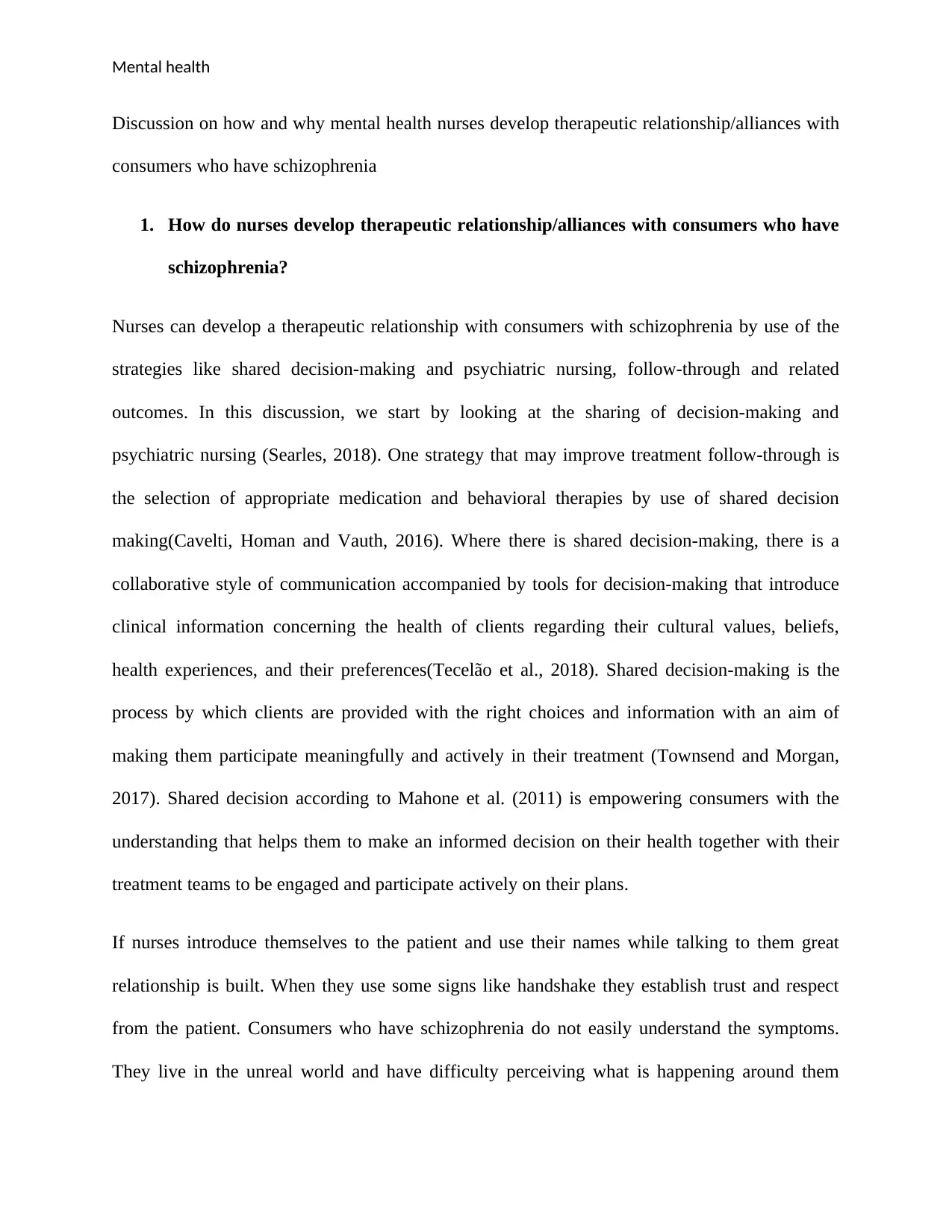
Mental health
Discussion on how and why mental health nurses develop therapeutic relationship/alliances with
consumers who have schizophrenia
1. How do nurses develop therapeutic relationship/alliances with consumers who have
schizophrenia?
Nurses can develop a therapeutic relationship with consumers with schizophrenia by use of the
strategies like shared decision-making and psychiatric nursing, follow-through and related
outcomes. In this discussion, we start by looking at the sharing of decision-making and
psychiatric nursing (Searles, 2018). One strategy that may improve treatment follow-through is
the selection of appropriate medication and behavioral therapies by use of shared decision
making(Cavelti, Homan and Vauth, 2016). Where there is shared decision-making, there is a
collaborative style of communication accompanied by tools for decision-making that introduce
clinical information concerning the health of clients regarding their cultural values, beliefs,
health experiences, and their preferences(Tecelão et al., 2018). Shared decision-making is the
process by which clients are provided with the right choices and information with an aim of
making them participate meaningfully and actively in their treatment (Townsend and Morgan,
2017). Shared decision according to Mahone et al. (2011) is empowering consumers with the
understanding that helps them to make an informed decision on their health together with their
treatment teams to be engaged and participate actively on their plans.
If nurses introduce themselves to the patient and use their names while talking to them great
relationship is built. When they use some signs like handshake they establish trust and respect
from the patient. Consumers who have schizophrenia do not easily understand the symptoms.
They live in the unreal world and have difficulty perceiving what is happening around them
Discussion on how and why mental health nurses develop therapeutic relationship/alliances with
consumers who have schizophrenia
1. How do nurses develop therapeutic relationship/alliances with consumers who have
schizophrenia?
Nurses can develop a therapeutic relationship with consumers with schizophrenia by use of the
strategies like shared decision-making and psychiatric nursing, follow-through and related
outcomes. In this discussion, we start by looking at the sharing of decision-making and
psychiatric nursing (Searles, 2018). One strategy that may improve treatment follow-through is
the selection of appropriate medication and behavioral therapies by use of shared decision
making(Cavelti, Homan and Vauth, 2016). Where there is shared decision-making, there is a
collaborative style of communication accompanied by tools for decision-making that introduce
clinical information concerning the health of clients regarding their cultural values, beliefs,
health experiences, and their preferences(Tecelão et al., 2018). Shared decision-making is the
process by which clients are provided with the right choices and information with an aim of
making them participate meaningfully and actively in their treatment (Townsend and Morgan,
2017). Shared decision according to Mahone et al. (2011) is empowering consumers with the
understanding that helps them to make an informed decision on their health together with their
treatment teams to be engaged and participate actively on their plans.
If nurses introduce themselves to the patient and use their names while talking to them great
relationship is built. When they use some signs like handshake they establish trust and respect
from the patient. Consumers who have schizophrenia do not easily understand the symptoms.
They live in the unreal world and have difficulty perceiving what is happening around them
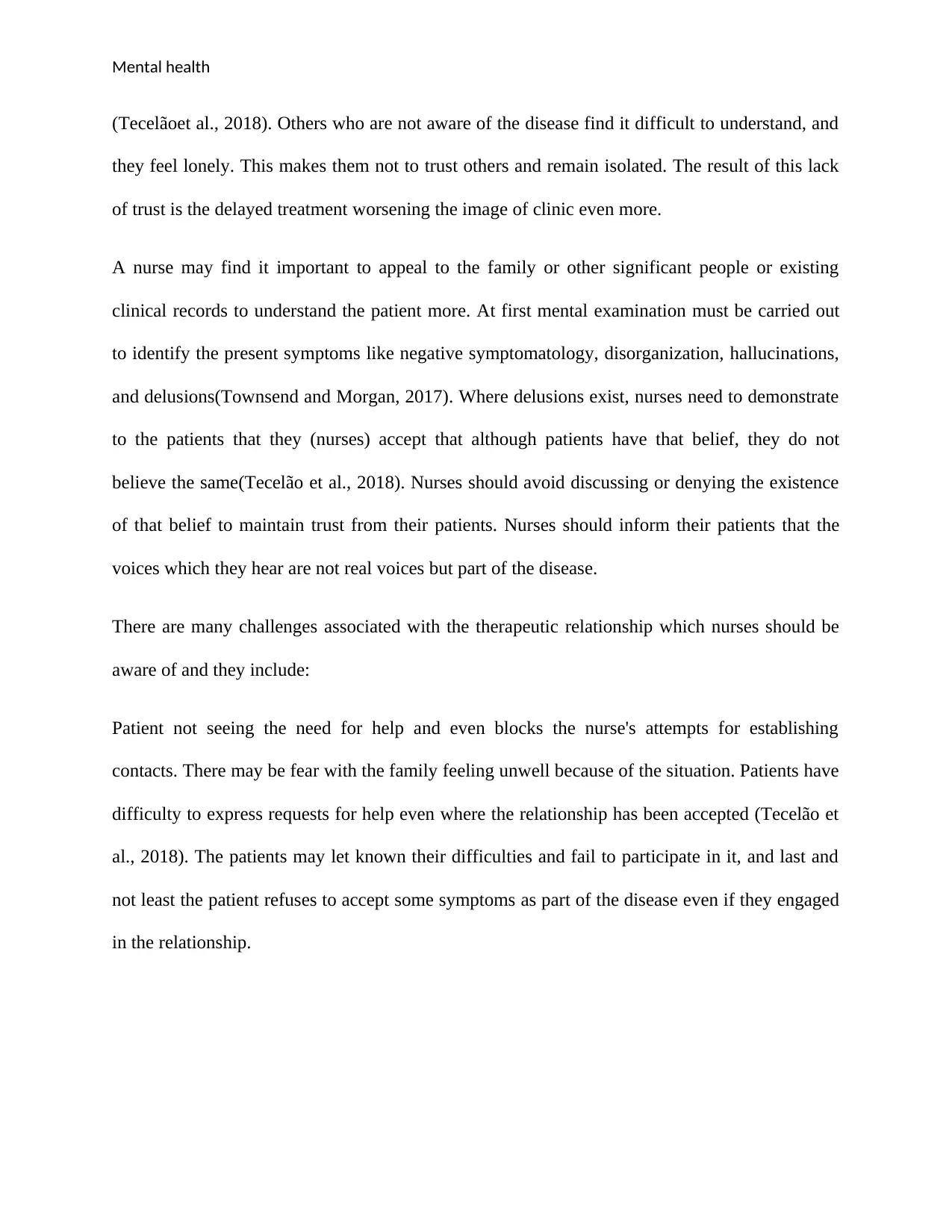
Mental health
(Tecelãoet al., 2018). Others who are not aware of the disease find it difficult to understand, and
they feel lonely. This makes them not to trust others and remain isolated. The result of this lack
of trust is the delayed treatment worsening the image of clinic even more.
A nurse may find it important to appeal to the family or other significant people or existing
clinical records to understand the patient more. At first mental examination must be carried out
to identify the present symptoms like negative symptomatology, disorganization, hallucinations,
and delusions(Townsend and Morgan, 2017). Where delusions exist, nurses need to demonstrate
to the patients that they (nurses) accept that although patients have that belief, they do not
believe the same(Tecelão et al., 2018). Nurses should avoid discussing or denying the existence
of that belief to maintain trust from their patients. Nurses should inform their patients that the
voices which they hear are not real voices but part of the disease.
There are many challenges associated with the therapeutic relationship which nurses should be
aware of and they include:
Patient not seeing the need for help and even blocks the nurse's attempts for establishing
contacts. There may be fear with the family feeling unwell because of the situation. Patients have
difficulty to express requests for help even where the relationship has been accepted (Tecelão et
al., 2018). The patients may let known their difficulties and fail to participate in it, and last and
not least the patient refuses to accept some symptoms as part of the disease even if they engaged
in the relationship.
(Tecelãoet al., 2018). Others who are not aware of the disease find it difficult to understand, and
they feel lonely. This makes them not to trust others and remain isolated. The result of this lack
of trust is the delayed treatment worsening the image of clinic even more.
A nurse may find it important to appeal to the family or other significant people or existing
clinical records to understand the patient more. At first mental examination must be carried out
to identify the present symptoms like negative symptomatology, disorganization, hallucinations,
and delusions(Townsend and Morgan, 2017). Where delusions exist, nurses need to demonstrate
to the patients that they (nurses) accept that although patients have that belief, they do not
believe the same(Tecelão et al., 2018). Nurses should avoid discussing or denying the existence
of that belief to maintain trust from their patients. Nurses should inform their patients that the
voices which they hear are not real voices but part of the disease.
There are many challenges associated with the therapeutic relationship which nurses should be
aware of and they include:
Patient not seeing the need for help and even blocks the nurse's attempts for establishing
contacts. There may be fear with the family feeling unwell because of the situation. Patients have
difficulty to express requests for help even where the relationship has been accepted (Tecelão et
al., 2018). The patients may let known their difficulties and fail to participate in it, and last and
not least the patient refuses to accept some symptoms as part of the disease even if they engaged
in the relationship.
⊘ This is a preview!⊘
Do you want full access?
Subscribe today to unlock all pages.

Trusted by 1+ million students worldwide
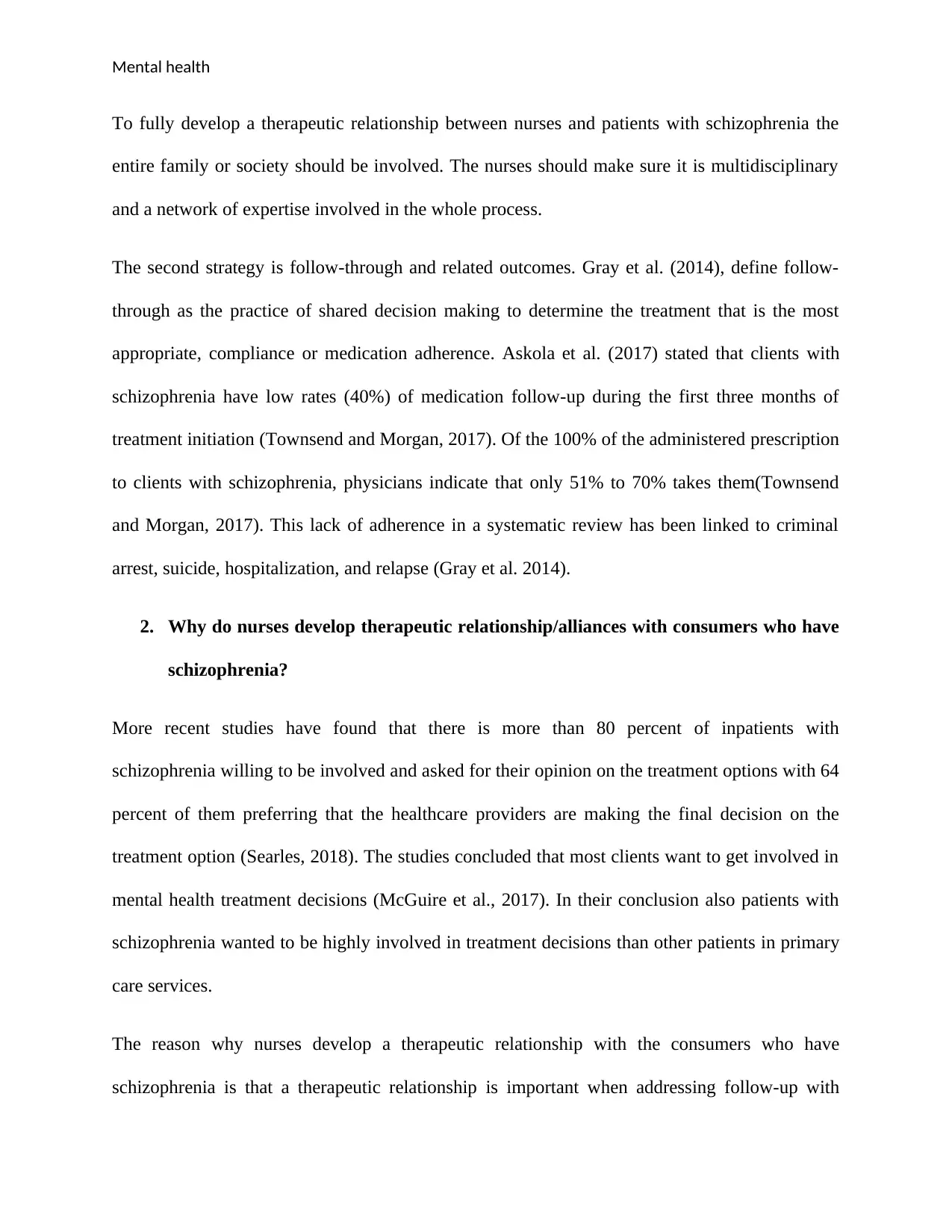
Mental health
To fully develop a therapeutic relationship between nurses and patients with schizophrenia the
entire family or society should be involved. The nurses should make sure it is multidisciplinary
and a network of expertise involved in the whole process.
The second strategy is follow-through and related outcomes. Gray et al. (2014), define follow-
through as the practice of shared decision making to determine the treatment that is the most
appropriate, compliance or medication adherence. Askola et al. (2017) stated that clients with
schizophrenia have low rates (40%) of medication follow-up during the first three months of
treatment initiation (Townsend and Morgan, 2017). Of the 100% of the administered prescription
to clients with schizophrenia, physicians indicate that only 51% to 70% takes them(Townsend
and Morgan, 2017). This lack of adherence in a systematic review has been linked to criminal
arrest, suicide, hospitalization, and relapse (Gray et al. 2014).
2. Why do nurses develop therapeutic relationship/alliances with consumers who have
schizophrenia?
More recent studies have found that there is more than 80 percent of inpatients with
schizophrenia willing to be involved and asked for their opinion on the treatment options with 64
percent of them preferring that the healthcare providers are making the final decision on the
treatment option (Searles, 2018). The studies concluded that most clients want to get involved in
mental health treatment decisions (McGuire et al., 2017). In their conclusion also patients with
schizophrenia wanted to be highly involved in treatment decisions than other patients in primary
care services.
The reason why nurses develop a therapeutic relationship with the consumers who have
schizophrenia is that a therapeutic relationship is important when addressing follow-up with
To fully develop a therapeutic relationship between nurses and patients with schizophrenia the
entire family or society should be involved. The nurses should make sure it is multidisciplinary
and a network of expertise involved in the whole process.
The second strategy is follow-through and related outcomes. Gray et al. (2014), define follow-
through as the practice of shared decision making to determine the treatment that is the most
appropriate, compliance or medication adherence. Askola et al. (2017) stated that clients with
schizophrenia have low rates (40%) of medication follow-up during the first three months of
treatment initiation (Townsend and Morgan, 2017). Of the 100% of the administered prescription
to clients with schizophrenia, physicians indicate that only 51% to 70% takes them(Townsend
and Morgan, 2017). This lack of adherence in a systematic review has been linked to criminal
arrest, suicide, hospitalization, and relapse (Gray et al. 2014).
2. Why do nurses develop therapeutic relationship/alliances with consumers who have
schizophrenia?
More recent studies have found that there is more than 80 percent of inpatients with
schizophrenia willing to be involved and asked for their opinion on the treatment options with 64
percent of them preferring that the healthcare providers are making the final decision on the
treatment option (Searles, 2018). The studies concluded that most clients want to get involved in
mental health treatment decisions (McGuire et al., 2017). In their conclusion also patients with
schizophrenia wanted to be highly involved in treatment decisions than other patients in primary
care services.
The reason why nurses develop a therapeutic relationship with the consumers who have
schizophrenia is that a therapeutic relationship is important when addressing follow-up with
Paraphrase This Document
Need a fresh take? Get an instant paraphrase of this document with our AI Paraphraser
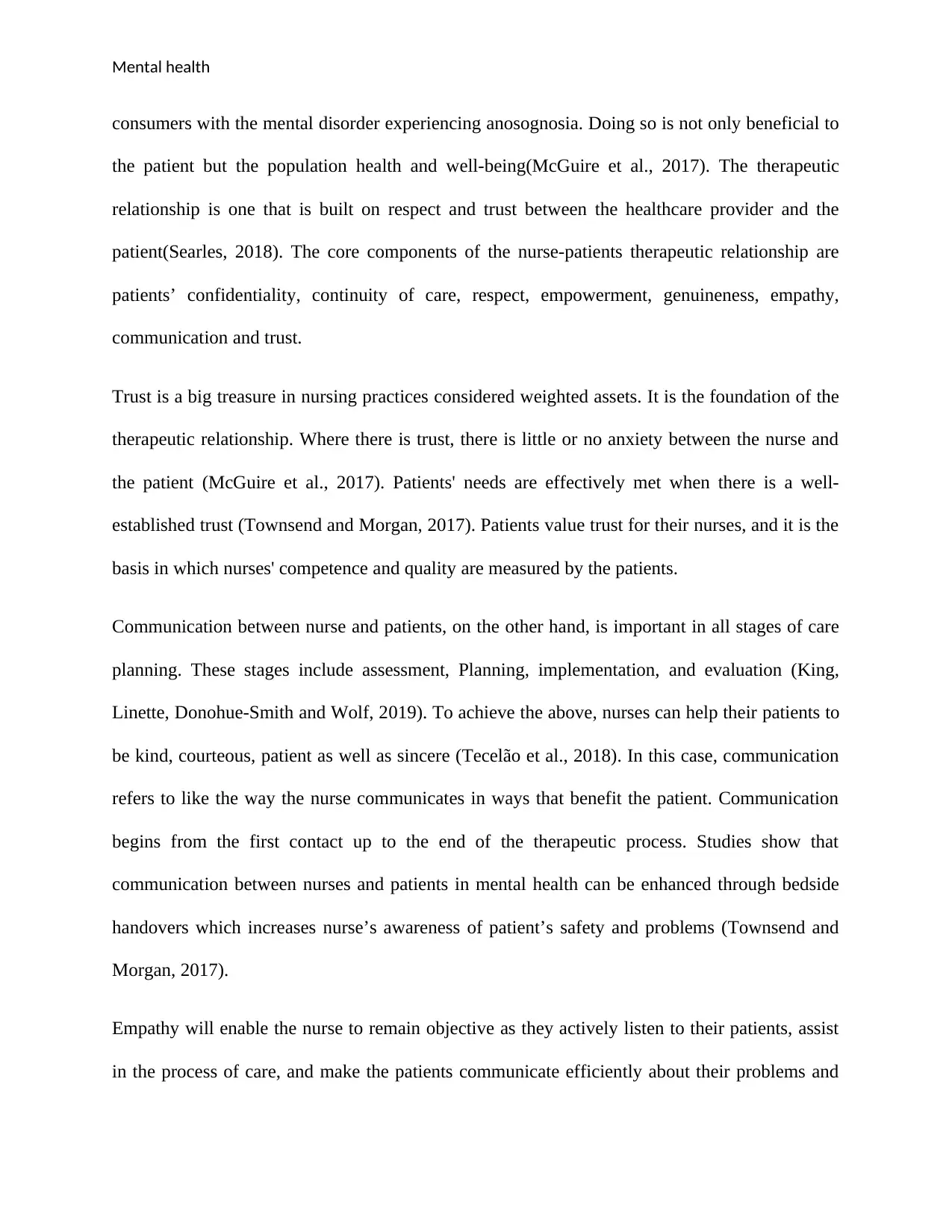
Mental health
consumers with the mental disorder experiencing anosognosia. Doing so is not only beneficial to
the patient but the population health and well-being(McGuire et al., 2017). The therapeutic
relationship is one that is built on respect and trust between the healthcare provider and the
patient(Searles, 2018). The core components of the nurse-patients therapeutic relationship are
patients’ confidentiality, continuity of care, respect, empowerment, genuineness, empathy,
communication and trust.
Trust is a big treasure in nursing practices considered weighted assets. It is the foundation of the
therapeutic relationship. Where there is trust, there is little or no anxiety between the nurse and
the patient (McGuire et al., 2017). Patients' needs are effectively met when there is a well-
established trust (Townsend and Morgan, 2017). Patients value trust for their nurses, and it is the
basis in which nurses' competence and quality are measured by the patients.
Communication between nurse and patients, on the other hand, is important in all stages of care
planning. These stages include assessment, Planning, implementation, and evaluation (King,
Linette, Donohue-Smith and Wolf, 2019). To achieve the above, nurses can help their patients to
be kind, courteous, patient as well as sincere (Tecelão et al., 2018). In this case, communication
refers to like the way the nurse communicates in ways that benefit the patient. Communication
begins from the first contact up to the end of the therapeutic process. Studies show that
communication between nurses and patients in mental health can be enhanced through bedside
handovers which increases nurse’s awareness of patient’s safety and problems (Townsend and
Morgan, 2017).
Empathy will enable the nurse to remain objective as they actively listen to their patients, assist
in the process of care, and make the patients communicate efficiently about their problems and
consumers with the mental disorder experiencing anosognosia. Doing so is not only beneficial to
the patient but the population health and well-being(McGuire et al., 2017). The therapeutic
relationship is one that is built on respect and trust between the healthcare provider and the
patient(Searles, 2018). The core components of the nurse-patients therapeutic relationship are
patients’ confidentiality, continuity of care, respect, empowerment, genuineness, empathy,
communication and trust.
Trust is a big treasure in nursing practices considered weighted assets. It is the foundation of the
therapeutic relationship. Where there is trust, there is little or no anxiety between the nurse and
the patient (McGuire et al., 2017). Patients' needs are effectively met when there is a well-
established trust (Townsend and Morgan, 2017). Patients value trust for their nurses, and it is the
basis in which nurses' competence and quality are measured by the patients.
Communication between nurse and patients, on the other hand, is important in all stages of care
planning. These stages include assessment, Planning, implementation, and evaluation (King,
Linette, Donohue-Smith and Wolf, 2019). To achieve the above, nurses can help their patients to
be kind, courteous, patient as well as sincere (Tecelão et al., 2018). In this case, communication
refers to like the way the nurse communicates in ways that benefit the patient. Communication
begins from the first contact up to the end of the therapeutic process. Studies show that
communication between nurses and patients in mental health can be enhanced through bedside
handovers which increases nurse’s awareness of patient’s safety and problems (Townsend and
Morgan, 2017).
Empathy will enable the nurse to remain objective as they actively listen to their patients, assist
in the process of care, and make the patients communicate efficiently about their problems and

Mental health
worries (Townsend and Morgan, 2017). The method of care is easy where there are empathy and
empathy determines the quality of care provided.
worries (Townsend and Morgan, 2017). The method of care is easy where there are empathy and
empathy determines the quality of care provided.
⊘ This is a preview!⊘
Do you want full access?
Subscribe today to unlock all pages.

Trusted by 1+ million students worldwide
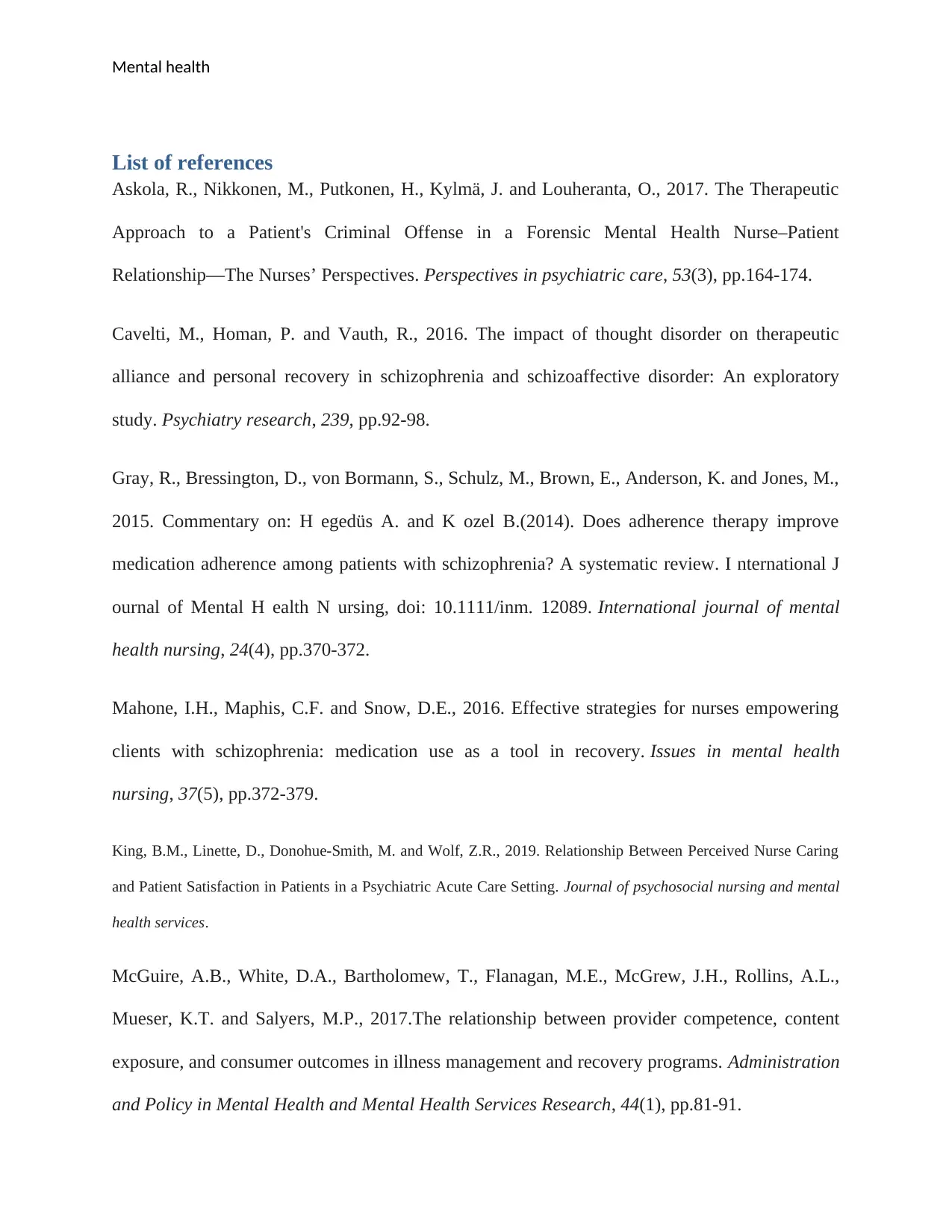
Mental health
List of references
Askola, R., Nikkonen, M., Putkonen, H., Kylmä, J. and Louheranta, O., 2017. The Therapeutic
Approach to a Patient's Criminal Offense in a Forensic Mental Health Nurse–Patient
Relationship—The Nurses’ Perspectives. Perspectives in psychiatric care, 53(3), pp.164-174.
Cavelti, M., Homan, P. and Vauth, R., 2016. The impact of thought disorder on therapeutic
alliance and personal recovery in schizophrenia and schizoaffective disorder: An exploratory
study. Psychiatry research, 239, pp.92-98.
Gray, R., Bressington, D., von Bormann, S., Schulz, M., Brown, E., Anderson, K. and Jones, M.,
2015. Commentary on: H egedüs A. and K ozel B.(2014). Does adherence therapy improve
medication adherence among patients with schizophrenia? A systematic review. I nternational J
ournal of Mental H ealth N ursing, doi: 10.1111/inm. 12089. International journal of mental
health nursing, 24(4), pp.370-372.
Mahone, I.H., Maphis, C.F. and Snow, D.E., 2016. Effective strategies for nurses empowering
clients with schizophrenia: medication use as a tool in recovery. Issues in mental health
nursing, 37(5), pp.372-379.
King, B.M., Linette, D., Donohue-Smith, M. and Wolf, Z.R., 2019. Relationship Between Perceived Nurse Caring
and Patient Satisfaction in Patients in a Psychiatric Acute Care Setting. Journal of psychosocial nursing and mental
health services.
McGuire, A.B., White, D.A., Bartholomew, T., Flanagan, M.E., McGrew, J.H., Rollins, A.L.,
Mueser, K.T. and Salyers, M.P., 2017.The relationship between provider competence, content
exposure, and consumer outcomes in illness management and recovery programs. Administration
and Policy in Mental Health and Mental Health Services Research, 44(1), pp.81-91.
List of references
Askola, R., Nikkonen, M., Putkonen, H., Kylmä, J. and Louheranta, O., 2017. The Therapeutic
Approach to a Patient's Criminal Offense in a Forensic Mental Health Nurse–Patient
Relationship—The Nurses’ Perspectives. Perspectives in psychiatric care, 53(3), pp.164-174.
Cavelti, M., Homan, P. and Vauth, R., 2016. The impact of thought disorder on therapeutic
alliance and personal recovery in schizophrenia and schizoaffective disorder: An exploratory
study. Psychiatry research, 239, pp.92-98.
Gray, R., Bressington, D., von Bormann, S., Schulz, M., Brown, E., Anderson, K. and Jones, M.,
2015. Commentary on: H egedüs A. and K ozel B.(2014). Does adherence therapy improve
medication adherence among patients with schizophrenia? A systematic review. I nternational J
ournal of Mental H ealth N ursing, doi: 10.1111/inm. 12089. International journal of mental
health nursing, 24(4), pp.370-372.
Mahone, I.H., Maphis, C.F. and Snow, D.E., 2016. Effective strategies for nurses empowering
clients with schizophrenia: medication use as a tool in recovery. Issues in mental health
nursing, 37(5), pp.372-379.
King, B.M., Linette, D., Donohue-Smith, M. and Wolf, Z.R., 2019. Relationship Between Perceived Nurse Caring
and Patient Satisfaction in Patients in a Psychiatric Acute Care Setting. Journal of psychosocial nursing and mental
health services.
McGuire, A.B., White, D.A., Bartholomew, T., Flanagan, M.E., McGrew, J.H., Rollins, A.L.,
Mueser, K.T. and Salyers, M.P., 2017.The relationship between provider competence, content
exposure, and consumer outcomes in illness management and recovery programs. Administration
and Policy in Mental Health and Mental Health Services Research, 44(1), pp.81-91.
Paraphrase This Document
Need a fresh take? Get an instant paraphrase of this document with our AI Paraphraser
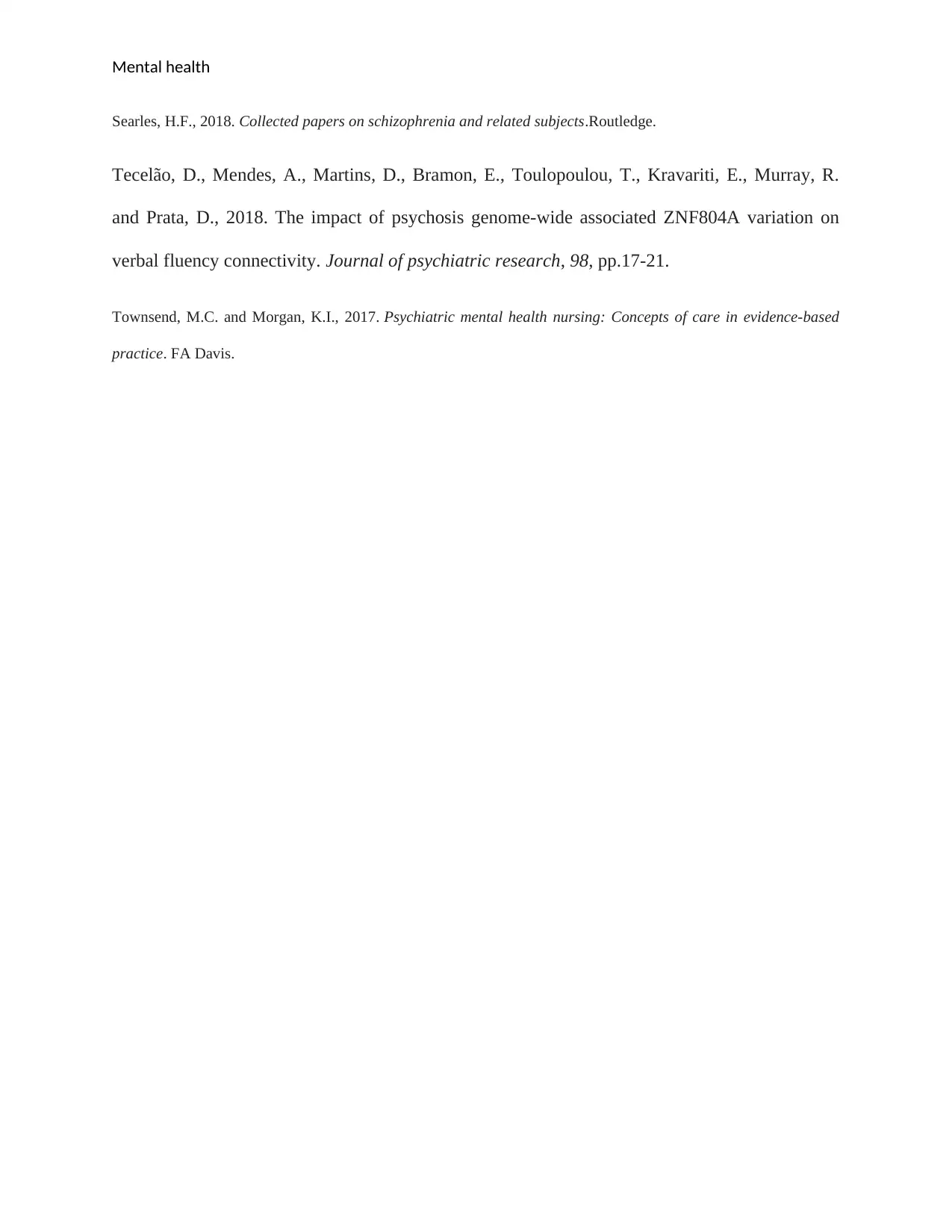
Mental health
Searles, H.F., 2018. Collected papers on schizophrenia and related subjects.Routledge.
Tecelão, D., Mendes, A., Martins, D., Bramon, E., Toulopoulou, T., Kravariti, E., Murray, R.
and Prata, D., 2018. The impact of psychosis genome-wide associated ZNF804A variation on
verbal fluency connectivity. Journal of psychiatric research, 98, pp.17-21.
Townsend, M.C. and Morgan, K.I., 2017. Psychiatric mental health nursing: Concepts of care in evidence-based
practice. FA Davis.
Searles, H.F., 2018. Collected papers on schizophrenia and related subjects.Routledge.
Tecelão, D., Mendes, A., Martins, D., Bramon, E., Toulopoulou, T., Kravariti, E., Murray, R.
and Prata, D., 2018. The impact of psychosis genome-wide associated ZNF804A variation on
verbal fluency connectivity. Journal of psychiatric research, 98, pp.17-21.
Townsend, M.C. and Morgan, K.I., 2017. Psychiatric mental health nursing: Concepts of care in evidence-based
practice. FA Davis.
1 out of 8
Related Documents
Your All-in-One AI-Powered Toolkit for Academic Success.
+13062052269
info@desklib.com
Available 24*7 on WhatsApp / Email
![[object Object]](/_next/static/media/star-bottom.7253800d.svg)
Unlock your academic potential
Copyright © 2020–2026 A2Z Services. All Rights Reserved. Developed and managed by ZUCOL.





